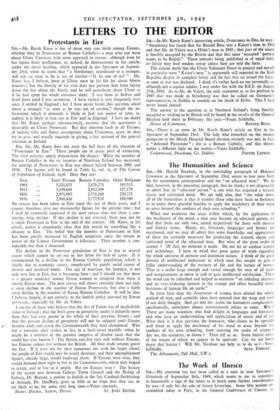The Humanities and Science
Sta,—Mr. Harold Nicolson, in the concluding paragraph of Marginal Comment in the Spectator of September 23rd, seems to lose taste both for his anonymous correspondent and for " an educated man." We do find, however, in the preceding paragraph, that he thinks it not disgraceful to admit that an " educated person " is one who has acquired a trained, elastic and cultivated mind. We are told, also, that " the value above all of the humanities is that it enables those who have been so fortunate as to enjoy these graceful benefits to apply the machinery of their mind to areas beyond the confines of their own schooling."
When one examines the areas within which, by the application of the machinery of the mind, a nian may become an educated person, we find that there are only two, suited respectively for those with musical and literary tastes. Music, art, literature, languages and history ate mentioned, and we may all admit that some knowledge and appreciation of these are certainly necessary for producing the trained, elastic and cultivated mind of the educated man. But what of the great realm of science ? Of that, no mention is made. Do not let us confuse science and technology. I have in mind that great quest of truth regarding the whole universe of animate and inanimate nature. I think of the great domain of intellectual endeavour in which man has sought to gain a fuller understanding of the mystery of life and the nature of matter. That is a realm large enough and varied enough for men of all tastes and temperaments to move in and to gain intellectual satisfaction. There the mind can be refreshed and helped to maintain "an unfailing alertness and an ever-widening interest in the strange and often beautiful mani- festations of human life on earth."
In these later days the discoveries of science have altered the whole outlook of men, and scientific ideas have entered into the warp and woof of our daily thought. And yet into this realm the humanists complacently, unashamedly, sometimes almost ostentatiously refuse to enter. Why ? There are many scientists who find delight in languages and literature, and who have an understanding and appreciation of music and of art. What then is it that prevents the humanist, who claims to be special)" well fitted to apply the machinery of his mind to areas beyond the confines of his own schooling, from entering the realm of science Are we, the scientists, to blame ? Then tell us so. Some barrier exists of the nature of which we appear to be ignorant. Can we not break down that barrier ? Will Mr. Nicolson not help us to do so ?—Yours
The Athenaeum, Pall Mall, S.W.r. •
ALEX. FINDLAY.














































 Previous page
Previous page